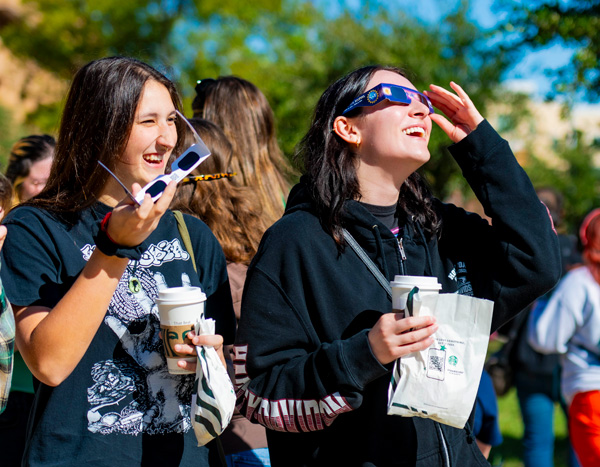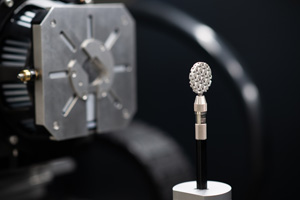|
|
|
|
|
|
 |
|
Totality Eclipse
The upcoming total solar eclipse in April is generating a buzz around the research community and general public alike. The celestial event offers a unique opportunity to see the atmosphere of the sun in a way that cannot be seen at any other time, even with special instrumentation, says Rebekah Purvis, UNT lecturer of physics. In an episode of UNT's The Lab series, Purvis discusses how scientists can use data gathered during a solar eclipse to help avert space weather catastrophes. Assistant professor Zoe Ortiz in UNT's history department also shared her expertise on how ancient civilizations viewed eclipses as omens — good and bad. The UNT College of Science will host pre-eclipse events March 23 and 30, offering attendees education about eclipses, family-friendly activities and an opportunity to pick up eclipse-viewing glasses. For the solar eclipse on April 8, faculty, staff and students will be spread across the Dallas-Fort Worth area, including at UNT's Denton and Frisco campuses, sharing knowledge on the day's big event. Eclipse telescopes from UNT's astronomy education program will be at all locations so visitors can safely get a high-powered view of the sun. If you can't make it out, the College of Science will stream the eclipse on UNT's YouTube. Learn more about UNT's 2024 Solar Eclipse festivities.
|
|
|
|
|
|
|
|
 Applying Additive Manufacturing Applying Additive Manufacturing
Researchers in the College of Engineering are participating in two projects funded by the U.S. Naval Research Office with separate grants totaling nearly $2.5 million. Both will use additive manufacturing to reach different goals. Regents Professors Raj Banerjee and Narendra Dahotre, who are affiliated with UNT's Center for Agile and Adaptive Additive Manufacturing (CAAAM), will be studying the best process to create materials made of two different metal components. Associate professor Nigel Shepherd in materials science and engineering is researching how to guarantee reliable connections through additive manufacturing methods for materials used in 5G communications.
|
|
|
|
|
|
| Enhancing Plant Products |
|
Researchers in the Department of Biological Sciences and BioDiscovery Institute at UNT earned $635,000 in grants from the U.S. Department of Agriculture to further understanding of cotton plant development as well as purchase laser microdissection equipment to enhance research capabilities in the North Texas and Southern Oklahoma region. College of Science faculty Brian Ayre and Roisin McGarry are researching ways to increase the resiliency and productivity of cotton. Specifically, they'll focus on cotton bast fibers, which are an underutilized part of the cotton plant that could hold immense potential for industrial applications, such as an alternative to synthetic fiber derived from fossil fuels. A separate USDA grant funded the purchase of a laser microdissection system to enhance UNT's food and agricultural research capabilities.
|
|
|
|
|
|
|
| New Frontiers in Music |
|
UNT's Center for Experimental Music and Intermedia (CEMI) has produced countless hours of performance-based research and gained a world-renowned reputation since it was founded by the late faculty composer Merrill Ellis in 1963. Its breadth of research and artistic work from faculty and students now spans across disciplines from fixed-media computer music to interactive performance and mixed reality. Read more about how CEMI is celebrating its trailblazing legacy and experience how the center is pushing boundaries in music and arts technologies in CEMI's 60th anniversary events, March 22-23.
|
|
|
|
|
|
|
| Uncovering Texas History |
|
During Texas History Month, associate professor of history Andrew Torget shared how technology can help in understanding the past more deeply in one of the latest episodes of UNT's The Lab YouTube series. Torget helped develop the Digital Stephen F. Austin Papers, which offers new ways to discover meaningful patterns within historical documents through text-mining, digital mapping and sentiment analysis. The Austin digital collection is not the first online archive at UNT to open up new horizons in the field. UNT Libraries' transformative Portal to Texas History has long made a trove of rare, historical and primary source materials from or about Texas history accessible to scholars and hobbyists alike and recently celebrated reaching two million items in its collection.
|
|
|
|
|
|
|
| Fictional Languages |
|
Dothraki, Klingon and Quenya may not be languages used in everyday life, but it turns out there is much to learn from these languages that have been designed to make fictional worlds come alive in popular books, films and television shows. UNT undergraduate linguistics majors Analiese Beeler and Carter Smith are using computational methods and statistical modeling to compare constructed languages — including Dothraki in Game of Thrones, Klingon in Star Trek and Quenya in Lord of the Rings — with natural languages such as Dutch, English and German that evolved over millennia. While the project is in its early stages, they have seen some level of variance between languages based on their metrics.
|
|
|
|
|
|
|